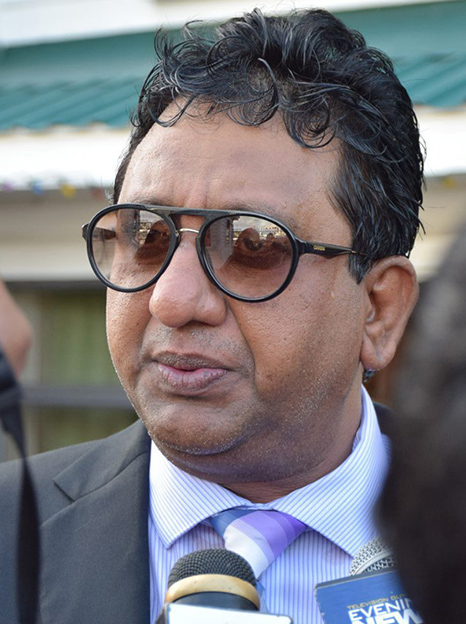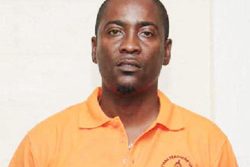Saying that sufficient evidence was not available at the time a contempt suit was initiated against Region Four Returning Officer (RO) Clairmont Mingo, attorney Anil Nandlall yesterday got approval to discontinue the proceedings but not before Chief Justice Roxane George-Wiltshire reprimanded him for wasting the court’s time.
While the judge granted Nandlall’s request to discontinue the proceedings, she awarded costs to Mingo and the other respondents, which amounted to $450,000 in total.
Opposition PPP/C supporter Reeaz Holladar had the contempt proceedings filed on March 12 against Mingo, Guyana Elections Commission (GECOM) chairperson Claudette Singh and Chief Election Officer Keith Lowenfield for failing to comply with a court order that was issued on the process to be followed for the declaration of the results for the region.
The very day after Mingo declared results using doctored numbers purportedly sourced from Statements of Polls (SOPs).
The case had been set yesterday for ruling.
However, when the matter was called the Chief Justice informed the virtual courtroom of reporters and attorneys on both sides that she was quite shocked to have received from Nandlall only a day before, notice that he no longer wished to proceed with the matter.
The Chief Justice, who said that she had already prepared her ruling, cited Nandlall for wasting the court’s time, especially since he knew from the inception that his client’s case was weak.
Nandlall, in his notice of application to withdraw-and-discontinue, said the filings were done when the respondents were in the process of violating the March 11 orders made by the court and important evidence was not available and not included in the application at that point in time. “Indeed, the most egregious violations of the Orders took place on March 13, 2020, that is, after the filing of the application,” he wrote.
He added that the national recount exercise undertaken by the respondents unearthed vast volumes of relevant and probative evidence which was not available at the time of filing and which would assist the court in determining whether its orders were violated. In this regard, he said he sought to have “this evidence” “marshalled and placed before the court in a proper form” but since this request was not favourably considered by the court, the application to discontinue was made. He did also note that the proceedings would be refiled with the relevant evidence.
When asked, Nandlall told the Chief Justice that he was very sorry for not making his application much earlier, especially since the court had enquired on previous occasions about the evidence which needed to meet a certain threshold in cases where what was being sought was the imprisonment of persons.
The Chief Justice pointed out that despite the court’s enquiry and knowing all along that the case was weak, Nandlall prolonged, withdrawing only a day before he knew the court was already set to rule.
Although accepting his error, an apologetic Nandlall said, “I felt it unsafe to withdraw the matter prematurely.”
Nandlall’s request to discontinue the case follows the completion of a tabulation from a recount of ballots cast at the March 2nd polls on Monday. The outcome of the polls have been marred by controversy and both the incumbent and the opposition claimed victory.
Though tabulation of votes from the recount show an opposition win, GECOM is yet to make an official declaration.
‘Most unacceptable’
For his part, attorney Neil Boston SC, who represented Mingo, yesterday argued strongly against a grant of Nandlall’s request to discontinue, urging the court to dismiss the case instead. He said that having conceded that he knew all along that the evidence was weak, it was unfair for Nandlall to have taken the court as far as he did, only to ask “through a side door” that he be allowed to withdraw and discontinue the proceedings.
Boston opined that Nandlall from “day one proceeded in bad faith.”
Underscoring that the litigant had almost a month during which she sought Nandlall’s guidance on evidence enough to meet the threshold required, the judge said that as recent as Tuesday she again enquired of Nandlall, whom she said was “still pondering.”
Noting that his application to withdraw comes after the entire case had been heard and a ruling already prepared to be delivered, the Chief Justice told the lawyer that his actions were “most unacceptable.”
Acknowledging that precious judicial time had been invested and now lost, Nandlall raised the issue of costs to be borne by his client, which he suggested be imposed in the sum of $100,000 as he contended that there was no full hearing.
With Holladar having died in the intervening period, however, the judge said that it raised the technical issue of how any cost would be paid since no one had been substituted in his stead as applicant. She pointed out, too, that contrary to Nandlall’s position, it was a full hearing with only an already prepared judgment left to be rendered.
Justice George-Wiltshire said that while she noted counsel’s intention to have Padmini Bhiro–Holladar’s common law wife–stand in his stead, that had not actually been done by the court and so it left the question as to how the cost would be paid.
It was at this point that the Chief Justice drew Nandlall’s attention to Part 64:08 of the Civil Procedure Rules (CPR), which provides for a wasted cost order which could be imposed against counsel.
Most vocal against any such order being issued against him personally, however, Nandlall sought to argue that there were times in cases before the courts where he had withdrawn matters and not been met with such sanction.
The Chief Justice, however, drew a distinction, enquiring whether in those cases counsel had known from the outset that he hadn’t a case but yet proceeded. She then questioned rhetorically whether it was not for such situations that that provision exists.
Nandlall advanced that he had been acting on instructions from his client, but this explanation was immediately dismissed by the judge, who said that such a situation would amount to the “tail wagging the dog.”
She told Nandlall that as the lawyer it is he who knows the law and what has to be satisfied legally.
Pointing out that he knew of the deficiencies of the evidence all along, but yet was considering “all other non-legal issues,” the judge asked Nandlall why a wasted cost order should not be imposed against him personally.
Nothing to flesh out
It was at this point that attorney Devindra Kissoon, who appeared in association with Nandlall made a bid to support his co-counsel but first admitted that indeed the evidence was “thin.”
The judge pointed out that she particularly liked his use of the word “thin,” because that was exactly what the evidence was. Kissoon then tried to explain that that was not what he wished to convey, but rather that there was nothing egregious committed on the part of Nandlall to warrant the cost being imposed against him personally.
Begging the court to be merciful towards his colleague, Kissoon said that in fleshing out the issues, Nandlall at the time had to work with what he had. The judge, however, said that there was nothing to flesh out. She noted that but for Kissoon’s plea of mercy on Nandlall’s behalf, she could well have imposed cost against him personally, even as she pointed out that many persons often make disparaging remarks against the court for being slow in dispensing with cases. The judge then pointed out that many times, however, there is the other dimension where the court’s invested time gets wasted as in this case but the situation is not always brought to the fore, especially given its efforts to still maintain operation as best it could with challenges during the current pandemic.
To Nandlall’s view that the matter was one of public interest and for which he should not be made to pay cost, Boston said he found that position strange while maintaining that knowing full well from the beginning that his client hadn’t a case, Nandlall acted in bad faith.
Noting that the case has since been “overtaken by events,” however, the Chief Justice granted Nandlall’s request to have it discontinued, while allowing Bhiro to be substituted as the applicant in the place of the deceased Holladar as she was made administratrix of his estate.
The judge then imposed costs in the sum of $450,000, with$150,000 each awarded to each respondent.
Following a first declaration made by Mingo on March 5, Holladar had challenged the exercise, and was granted an injunction prohibiting any final declaration of the election results from the CEO.
Finding substantial non-compliance by Mingo with the Representation of the People Act, the Chief Justice granted the injunction since the manner in which that purported declaration of votes for District Four was done, flouted the law.
Section 84 the Representation of the People Act specifies the process for the counting of votes which stipulates that votes must be added up in accordance with the SOPs.
It prescribes, among other things, that as soon as practicable after the receipt of all the ballot boxes and the envelopes and packets delivered to him in pursuance of Section 83 (10), the RO shall, in the presence of those legally entitled to be in attendance, ascertain the total votes cast in favour of each list in the district by adding up the votes recorded in favour of the list in accordance with the SOPs and thereupon publicly declare the votes for each list of candidate.
Instead of the SOPs, Mingo had used a spreadsheet from which numbers had been called, without producing any corresponding SOPs for observers to see.






